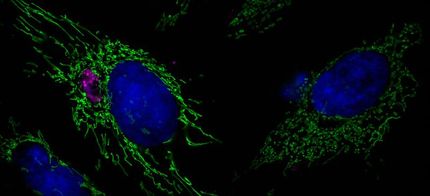Degrading modified proteins could treat Alzheimer’s, other ‘undruggable’ diseases
New technique specifically targets and breaks apart certain proteins — rather than just interfering with them
Advertisement
Certain diseases, including Alzheimer’s, are currently considered “undruggable” because traditional small molecule drugs can’t interfere with the proteins responsible for the illnesses. But a new technique that specifically targets and breaks apart certain proteins — rather than just interfering with them — may offer a pathway toward treatment. Researchers reporting in ACS Central Science have, for the first time, designed a compound that targets and breaks down a posttranslationally modified protein closely associated with Alzheimer’s disease.

Symbolic image
Computer-generated image
Researchers have been exploring targeted protein degradation (TPD) as a way to get at hard-to-treat proteins, namely, the ones for which inhibitors or other conventional techniques fail. Though these degraders have shown some initial promise, things can get complicated if the proteins go through “post-processing,” or posttranslational modifications, after being formed. Thus far, no TPD technique has been able to target this type of protein.
One protein that would be particularly advantageous to break down is p38, which is involved in several cellular signaling pathways and is linked to the development of Alzheimer’s disease. Although previous attempts to treat the disease by focusing on p38 have been made — including a drug candidate that went through two phases of clinical trials — they suffered from off-target effects and limited efficacy. But like many proteins, p38 goes through posttranslational modifications, including phosphorylation, to form p-p38. This adds a phosphate group to the protein, activating it and changing its shape. By homing in on this form instead, the treatment could be made more specific. So, Nam-Jung Kim, Kyung-Soo Inn, Jong Kil Lee and colleagues wanted, for the first time, to create a protein degrader that could target and break down p-p38, and potentially offer a new avenue for treating Alzheimer’s disease.
The team screened several compounds specific for p-p38, eventually finding PRZ-18002, which selectively induced degradation of p-p38 over both similar proteins and its inactivated form. In fact, PRZ-18002 maintained its selectivity even when tested against 96 different protein kinases similar to p38. When delivered to the brains of mouse models of Alzheimer’s disease, the compound downregulated the p38 pathway, improving cognitive abilities, including spatial reasoning, and disease-related brain chemistry, such as the accumulation of amyloid-beta plaques. The researchers say that this work could someday provide a novel treatment for Alzheimer’s disease and open up opportunities for future treatments of other diseases that also involve modified proteins.



























































